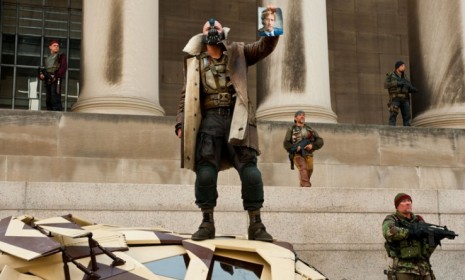Does The Dark Knight Rises have a political agenda?
With its exploration of terrorism and class warfare, the conclusion to Christopher Nolan's Batman trilogy appears to channel 2012's headlines

A free daily email with the biggest news stories of the day – and the best features from TheWeek.com
You are now subscribed
Your newsletter sign-up was successful
Incendiary radio host Rush Limbaugh recently embarrassed himself by suggesting that The Dark Knight Rises — the final installment in director Christopher Nolan's Batman trilogy — is part of a liberal conspiracy to smear GOP presidential candidate Mitt Romney. Limbaugh's proof? The name of the movie's villain, Bane, sounds identical to Romney's former private equity firm, Bain Capital. However, while Limbaugh was roundly mocked (the comic-book character Bane was created in the 1990s), he's not the only one seeing a political agenda in the movie, which is laden with themes of terrorism and economic disgruntlement. And Nolan's Batman trilogy has been flagged before for its ostensibly political views — the second installment, The Dark Knight, was hailed by conservatives for Batman's brutal interrogation of The Joker, who was effectively a terrorist. Does The Dark Knight Rises have a political agenda?
Yes. Nolan eviscerates Occupy Wall Street: "The conservative themes coursing through The Dark Knight were no accident," and The Dark Knight Rises "pushes the ideological envelope even further," says Christian Toto at Big Hollywood. Nolan casts Bane as the leader of a "ragtag movement with a propensity for violence" against the wealthy, evoking Occupy Wall Street. "Bane's henchmen literally attack Wall Street, savagely beat the rich, and promise the good people of Gotham that 'tomorrow, you claim what is rightfully yours.'" The movie is a damning indictment of the anti-corporate movement and the threat of social chaos it poses.
"The Dark Knight Rises review: Batman battles Bane, Nolan nukes Occupy Wall Street"
The Week
Escape your echo chamber. Get the facts behind the news, plus analysis from multiple perspectives.

Sign up for The Week's Free Newsletters
From our morning news briefing to a weekly Good News Newsletter, get the best of The Week delivered directly to your inbox.
From our morning news briefing to a weekly Good News Newsletter, get the best of The Week delivered directly to your inbox.
Yes. But Nolan sympathizes with Occupy Wall Street: While director (and co-screenwriter) Nolan claims that his movie is "above partisanship," Rises clearly has a "down-with-the-system undercurrent," says Jordan Zakarin at The Hollywood Reporter. Nolan's Catwoman is full of "clearly populist talk, and her character is a thief, stealing from the rich." At one point, when talking to Bruce Wayne, Batman's billionaire alter-ego, she says, "When it hits, you're all gonna wonder how you ever thought you could live so large and leave so little for the rest of us." And Batman's always been a less-than-admirable hero, "a full fledged member of the one percent" who acts like a "Benevolent Dictator" when it comes to matters of the law.
"The Dark Knight Rises' politics: Is Christopher Nolan's Batman series liberal or conservative?"
No. Nolan is merely capturing those political tensions: While superheroes of yore could unequivocally stand on the side of "truth, justice, and the American way," Nolan's Batman is an ambiguous figure in a more complex era, says Manohla Dargis at The New York Times. Over the three films, Batman has "oscillated between seemingly opposite poles" — "savior and destroyer, human and beast, the ultimate radical individualist and people's protector." The distinctions between his two sides have "grown progressively messier," and it's impossible to force his character into a black-and-white, liberal v. conservative framework. Nolan "isn't overtly siding with or taking aim at any group" — rather, he is using Batman's inner conflicts to reflect the tensions in the society the Caped Crusader seeks to save.
"Ground Zero for the Caped Crusader"
A free daily email with the biggest news stories of the day – and the best features from TheWeek.com
-
 The environmental cost of GLP-1s
The environmental cost of GLP-1sThe explainer Producing the drugs is a dirty process
-
 Greenland’s capital becomes ground zero for the country’s diplomatic straits
Greenland’s capital becomes ground zero for the country’s diplomatic straitsIN THE SPOTLIGHT A flurry of new consular activity in Nuuk shows how important Greenland has become to Europeans’ anxiety about American imperialism
-
 ‘This is something that happens all too often’
‘This is something that happens all too often’Instant Opinion Opinion, comment and editorials of the day